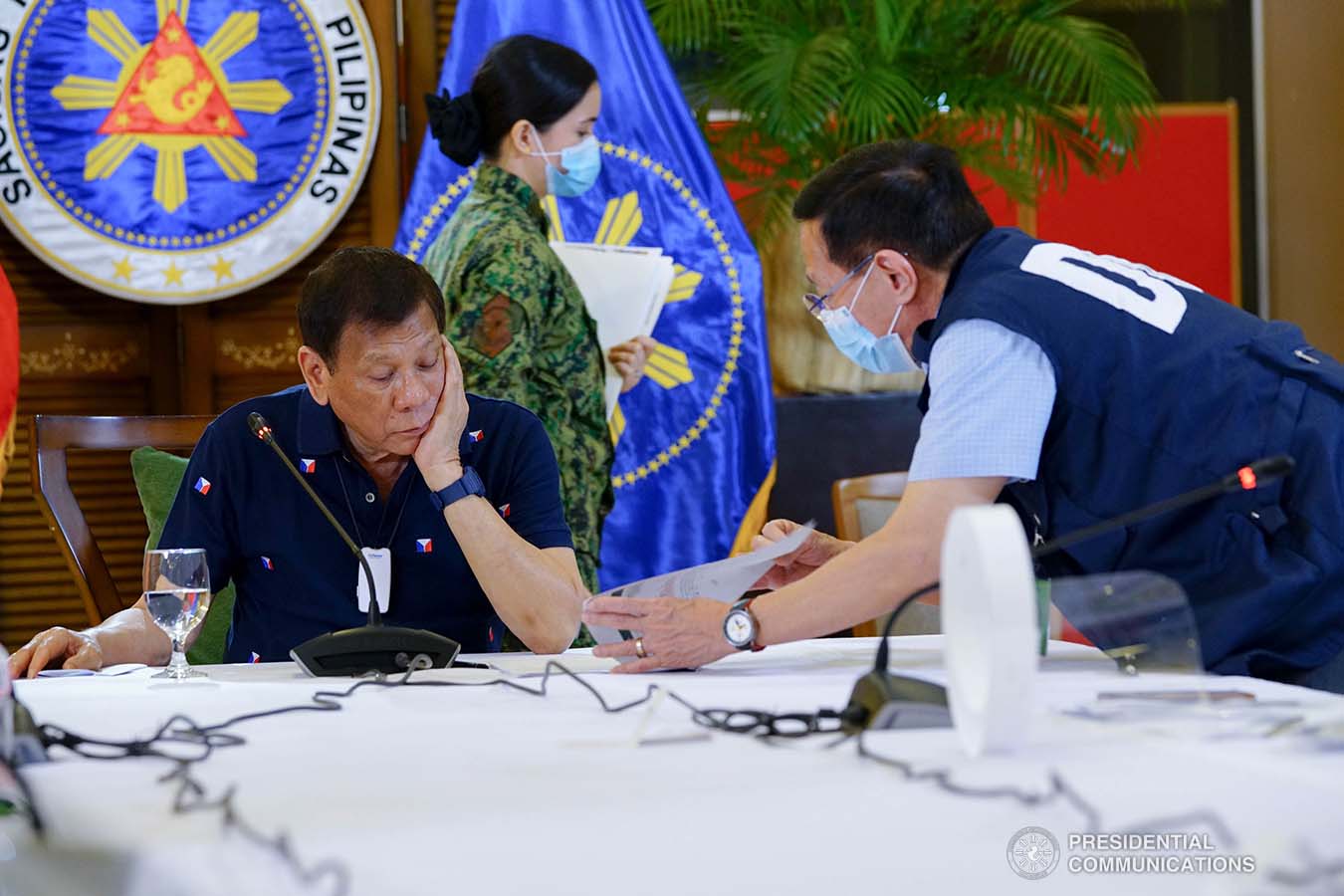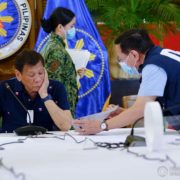
Despite growing criticism over the proposed Anti-Terrorism Act of 2020, President Rodrigo Duterte will run a “final review” before signing it into law to ensure that it complies with the 1987 Constitution.
“Alam niyo, bagamat it’s certified urgent, hindi naman po automatic na pipirmahan yan ng presidente (You know, even if it was certified urgent, it does not mean that the president will automatically sign it),” Presidential Spokesperson Harry Roque said in a virtual presser on Thursday, June 4.
“That is still subject to final review by the president to ensure that it is compliant with our Constitution,” he added.
The House of Representatives on Wednesday, June 3, approved HB 6875 on its third and final reading.
A total of 173 lawmakers voted to pass the measure, while 31 voted against its passage. 29 others, on the other hand, abstained.
According to Roque, Duterte would not allow unconstitutional provisions in the proposed law.
“Dadaan pa rin yan sa isang final review para titingnan kung may probisyon na labag sa Saligang Batas bago po pirmahan ng presidente (It will undergo a final review to see if there are provisions that violate the Constitution before it is signed by the president),” he assured.
The spokesman also said the anti-terror bill will not infringe on Filipinos’ freedom of speech.
“I think dito sa Pilipinas, hindi mo na talaga masusupil ang karapatan ng malayang pananalita dahil hindi na po papayag ang sambayanang Pilipino (here in the Philippines, you can no longer curtail freedom of expression because the Filipinos will not allow it),” Roque said.
Still, the United Nations Human Rights Office expressed concern over the impending law.
“The proposed 2020 Anti-Terrorism Act, slated to replace the already problematic Human Security Act, dilutes human rights safeguards, broadens the definition of terrorism and expands the period of detention without warrant. The vague definitions in the Anti-Terrorism Act may violate the principle of legality,” the UN Office of the High Commissioner for Human Rights said in a statement on Thursday.
It also described the bill as “much worse” than the current law it seeks to replace.
“We’re very worried. Currently there’s the Human Security Act which is in place. The UN human rights mechanisms have already expressed concerns about the current law in that it gives too much discretion to the authorities and the definition of terrorism is too broad. Now this new proposed anti-terrorism law makes it much worse,” said Ravina Shamdasani of the UN Human Rights Office.
Once signed into Law, HB No. 6875 grants any law enforcer to arrest and detain without warrant “a person suspected of committing any of the acts” punishable under the measure for 14 calendar days, extendable by 10 days. The suspected “terrorist” can also be placed under surveillance for 60 days, extendable by up to 30 more days, by the police or the military.
Acts punishable under HB No. 6875 include:
• Engaging in acts intended to cause death or serious bodily injury to any person, or endangers a person’s life;
• Engaging in acts intended to cause extensive damage or destruction to a government or public facility, public place, or private property;
• Engaging in acts intended to cause extensive interference with, damage, or destruction to critical infrastructure;
• Developing, manufacturing, possessing, acquiring, transporting, supplying or using weapons; and
• Releasing of dangerous substances, or causing fire, floods or explosions.
Any person who will propose, incite, conspire, participate in the planning, training, preparation, and facilitation of a terrorist act; as well as those who will provide material support to terrorists, and recruit members in a terrorist organization will also be penalized by life imprisonment without the benefit of parole.
Meanwhile, anyone who will threaten to commit terrorism, and those who will propose any terroristic acts or incite others to commit terrorism will suffer imprisonment of 12 years.
This goes the same for anyone who will voluntarily and knowingly join any organization, association or group of persons knowing that such is a terrorist organization.
House Minority Leader and Manila 6th District Rep. Benny Abante, who voted against the bill, said: “Under this bill, anyone suspected of being a terrorist can be detained without warrant for up to 24 days.”
“Hindi po ‘yan ang aking ipinapangarap para sa aking mga anak at apo (This isn’t what I was wishing for my children and grandchildren). The questionable and unconstitutional provisions of this bill defeat the very purpose why we are enacting this bill in the first place,” he added.
Quezon City 6th District Rep. Jose Christopher “Kit” Belmonte also voted no, saying the bill is “intended to widen the net on who can be considered as terrorists.”
He added: “With this bill, in the guise of protecting our country, we are in fact undermining it. We are repressing our freedoms. We are, in fact, destroying our democracy.”
Gabriela Rep. Arlene Brosas also pointed out that the ordinary people who are angry at the government are the first ones who will be arrested if the bill is signed into law.
“Kung di ka raw terorista, wala ka raw dapat ikatakot sa panukalang ito. Pero klaro sa mga probisyon ng anti-terror bill na kahit ordinaryong mamamayan ay puwedeng maakusahan na terorista by mere association of a terrorist act (They said if you are not a terrorist, there’s nothing to be afraid of. But it’s clear with the anti-terror bill’s provisions that ordinary men can also be accused of being a terrorist by mere association of a terrorist act),” she said.
Meanwhile, Surigao del Norte 2nd District Rep. Robert Ace Barbers defended his vote to pass the measure, saying “For terrorists, this bill is laudable. Putting them in custody for long periods to extract valuable information from them is ideal.”





